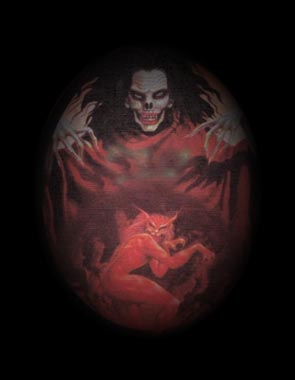
The beginnings of demons’ and guarding spirit’s evocation apparently lay in the babylonian or assyrian culture.
Many in excavation found texts prove that the magicians were highly respected because of their ability to use and control these powers. Evocation in general was then more popular then ever after.
The writings of Hammurabi say that there even was a guild of magicians, and other indices we found in the library of Assurbanipal (about 2800 B.C.) prove that the art of casting demons and fortune-telling was ruling the social life of nearly every part of the society.
The rituals and texts about evocation were mostly written in two languages, a sumerian original and semitic copies, and were copied and re-written again and again within the guild to always leave an original to the novices. The texts used for evocations were written on boards, the titles were usually in relation to the main rituals. There were four collections of this board texts.
Spells against the evil Uttuki
Spells against the demon of plague, Labartu
Spells against the demon Asakku
The ritual burn of Schurpu and Maqlu
(also see “Demons in the history of literature”)
Otherwise there were some other, rather unimportant boards which told about the evocation of different other demons. But in the babylonian belief, every demon was an envoy of the plague god
Ura or the gods of the underworld, Ereschkigal and Nammtar, anyway, so they were either demons of sickness or demons of storms.
Members of this group were Alu (the one without a mouth), the sexless Gallu,
Rabisu (the watcher), the animal-shaped Schedu, the triad of fever demons –
Lilu, Lilitu and Ardat Lili, the demon of plague Namtaru,
Dementum (the evil course), Sadiru (the presser), Scharradu (the slanderer),
Redu (the pursuader) and the so called “evil seven”, who attacked, in the shape of wild animals, the god of the moon, and so caused a darkening of the
sky.
With the help of this board texts, protection spells against these demons were casted, purification was celebrated for posessed ones, but some rites were also supposed to make a demon harm a personal enemy. But not only the leaders were using the services of the magicians guild to tell their fortune, also merchants did. It’s, for example, proved that Ammizaduga (around 2100 B.C.) wanted his manager to have some sign interpreted before he sent out a grain transport.
The priests who did the castings (this profession was, by the way, inheritable) were mostly serving the gods
Ea or Marduk and were called Maschmaschu or Aschipu.
They were respected by everyone.
Witches and blackmages were feared, because people tought that enormous strength belonged to these creatures, and that they were masters of dangerous demons. It was even told that they had sometimes power over the gods, and people especially feared their evil view.
From the babylonian/assyrian origin, the belief in the power of casting demons survived, trough many myths and religions, until today.